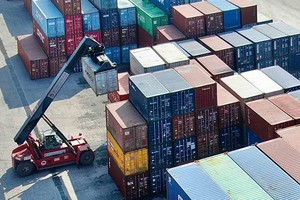In a recently published report on the 500 largest private enterprises in Vietnam between 2020 and 2021, the research team of the Vietnam Institute for Development Strategies and Germany’s Konrad-Adenaeur-Stiftung Vietnam Institute said that in 2 years, 158 large businesses have not developed forcing them to leave the group of 500 largest private enterprises in Vietnam.
Businesses in fields such as real estate and construction, trade, textiles and garments leaving the group were heavily affected by the Covid-19 epidemic. Of 89 real estate and construction businesses, 23 left VPE500 while 15 trade businesses, seven textiles and garment companies and 9 food processing firms left the group.
The pandemic also reduces the labor size of businesses. Compared to 2019, the average labor size per enterprise in 2020 decreased by 4.13 percent; for instance, the group of state-owned enterprises saw the labor scale decrease by 2.7 percent while the group of foreign direct investment enterprises reduced by 13.8 percent, and private enterprises decreased by 3.8 percent. The report also said that VPE500 has a spillover impact on investment to domestic private enterprises with a greater impact on foreign direct investment enterprises and state-owned enterprises.
If VPE500 pours one percent of investment capital, it will help increase domestic private enterprise investment by 0.45 percent in the first year and by 0.26 percent in the following year. On the other hand, from 2019 to 2021, the group of 500 large domestic private enterprises only accounted for 0.075 percent of the country's private enterprises, offered employment for 12 percent of labor and they achieved 28 percent of total assets and 18.4 percent of revenue.
The analysis of VPE500 and relationships with domestic private enterprises in the report has shown that it is necessary to have more specific policies to build a force of large private enterprises with stable development and resistance to outside impacts for the increased efficiency of the country’s economy.
Policies for businesses in the coming time need to continue to be improved in a way that not only facilitates businesses' entering the market but also helps businesses survive and grow. To build private enterprises that lead the market, the Government must introduce policies to support business development especially policies to encourage large enterprises to invest in improving productivity and gradually shifting to in-depth growth.
Moreover, the government should have economic policies to promote business linkages, encourage large enterprises, state-owned enterprises, and foreign direct investment enterprises to enter joint ventures, and link domestic small and medium-sized enterprises.
In addition, there needs to be a policy to improve the capacity of businesses to participate in production networks, supply chains, and global value chains.
























